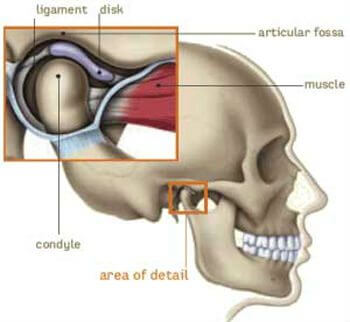Our temporomandibular joints are located on either side of our jaw, connecting the jaw or mandible to the skull. The acronym TMJ is used to refer to these joints. TMJ disorder is a syndrome or dysfunction of these joints that can be manifest as pain in the jaw or head or other symptoms. Unfortunately many people suffer for years from TMJ syndrome and are misdiagnosed by general medical practitioners before they get the relief they need.
What Is a TMJ Dentist?
TMJ dentistry is not recognized as a specialty by the American Dental Association, but many dentists recognize that successfully treating this disorder requires advanced training and most dentists do not feel qualified in this area and will shy away from it. Dr. Susan Dennis, however, enjoys the challenge of treating this complex disorder. She has completed advanced coursework in TMJ treatment and complex restorative dentistry with both the L.D. Pankey Institute in Key Biscayne, Florida, and Spear Education in Scottsdale, Arizona. In addition, she has many years of experience in successfully treating patients with TMJ syndrome.
The Symptoms of TMJ Disorder
There are a variety of symptoms of this disorder and many of them mimic other problems, which is why it is so often misdiagnosed.
Pain in the facial muscles and jaw joints may radiate to the neck or shoulders. Joints may be overstretched. You may experience muscle spasms. You may feel pain every time you talk, chew, or yawn. Pain usually seems to come from the joint itself, in front of the ear, but it may move elsewhere in the skull, face, or jaw.
In some cases the TMJ may cause ear pain, ringing in the ears (tinnitus), and hearing loss. Sometimes people mistake TMJ pain for an ear problem, such as an ear infection, because the ear is so close to the joint.
For some variations of this disorder, when the joints move, you may hear sounds, such as clicking, grating, or popping. They may be loud enough for others to hear. Clicking and popping are common when the disc is displaced. If there is no pain associated with the sounds, no treatment may be needed.
In some cases your face and mouth may swell on the affected side.
The jaw may become dislocated and lock wide open, or it may not open fully at all. Also, upon opening, the lower jaw may deviate to one side. You may find yourself favoring one painful side or the other by opening your jaw awkwardly. These changes could be sudden. Your teeth may not fit properly together, and your bite may feel odd.
You may have trouble swallowing because of the muscle spasms.
If severe, headache and dizziness may be caused by TMJ, enough so that you may feel nauseous or vomit.
Possible Causes
If you have pain associated with your TMJ, it is possible that it is caused by an injury, bruxism (grinding your teeth), or some sort of misalignment of the teeth. It can develop at any point in life. As you can see in the illustration to the left, the temporomandibular joint is the junction where the jawbone hinges and is a very complex joint. The enlarged area shows how the bone, ligament, and soft disk fit together when the jaw is closed. This unique joint allows for complex movements of the jaw—opening, closing, side-to-side, and forward and back.
If you have TMJ syndrome, what is probably much more important to you is that the symptoms can be prolonged and severe enough to interfere with your normal daily activities. They can include dizziness, headaches, or migraines, especially developing in the morning. Pain in the face, neck, or shoulders, and earaches, tinnitus or ringing in the ears, and hearing loss are also symptoms of TMJ. And jaw pain or tenderness, difficulty biting or chewing, trouble opening and closing the mouth, and clicking, popping, or grating sounds when the mouth is opened or closed can also indicate TMJ disorder.
TMJ Treatment
Diagnosing the cause of the TMJ dysfunction is the first step in providing lasting relief. While some patients benefit from simple exercises accompanied by moist heat, others will wear an orthotic bite splint to bring about alignment. More complex treatments, including adjustments to the way the teeth come together in the bite and full-mouth reconstruction, are sometimes needed for patients with severe bite problems.
If you would like to find out if your symptoms could be caused by TMJ syndrome, you may call our office or click here to request an appointment online.
